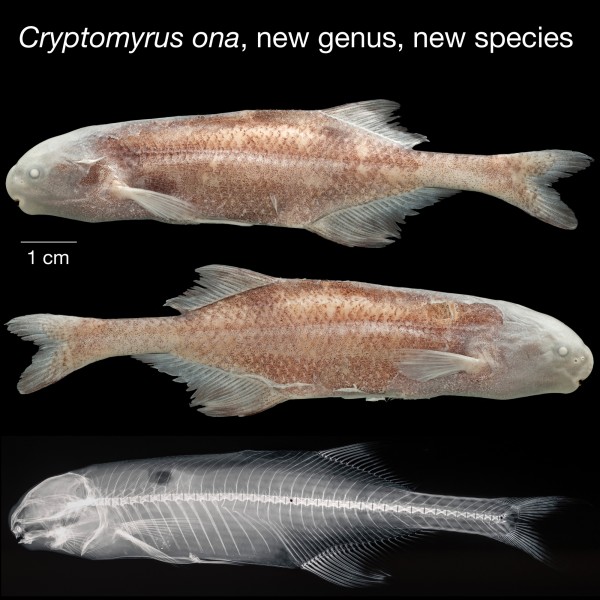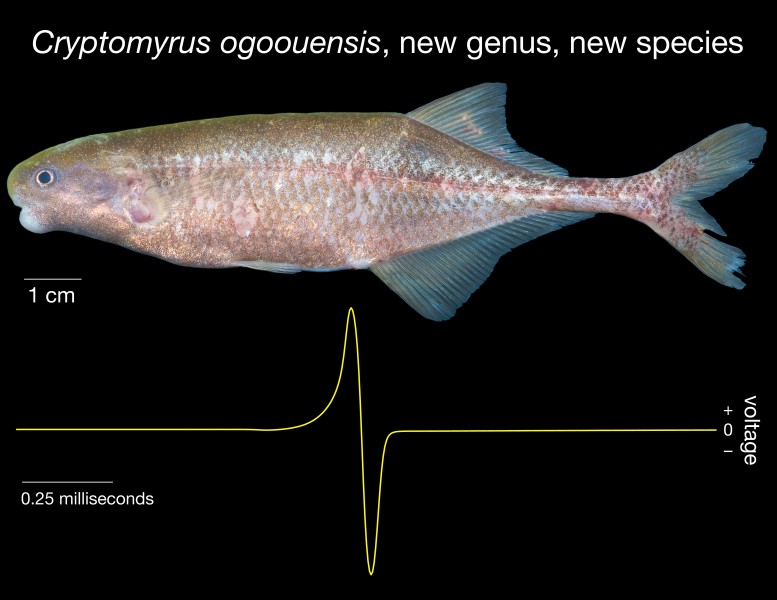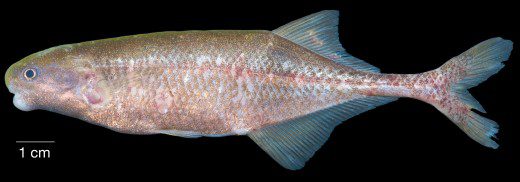The discovery of a new species of mormyrid, a “weakly electric” fish endemic to the continental freshwaters of Africa, has led to the creation of a new genus containing not one but two new species.The new find shed light on two mis-classified specimens found years earlier.This is the first new genus discovered in nearly 30 years.
The discovery of a new species of mormyrid, a “weakly electric” fish endemic to the continental freshwaters of Africa, has led to the creation of a new genus containing not one but two new species.
Mormyrids emit electric discharges so weak that humans can’t feel them. The fish have highly sensitive receptor cells on their skin, however, allowing them to use those electric discharges for navigation — they detect objects in their way as a distortion of the electric field they produce — as well as for communicating with other mormyrids.
John Sullivan, an ichthyologist at Ithaca, NY’s Cornell University who is an expert in the Mormyridae family, found the first new species of mormyrid on the Ogooué River in Gabon, a country on central Africa’s west coast.
“I distinctly recall pulling this fish from the trap, looking at it in my hand, and thinking, ‘I do not know what this is,’” Sullivan said, according to a blog post by the Nature Conservancy, which helped fund the expedition that led to the new discoveries.
When Sullivan and his colleagues compared the new catch to two existing specimens — one caught in the Moukalaba River at its confluence with the Nyanga River, the other caught in the Mabounié River — the scientists determined the three fish represent a new genus, which they called Cryptomyrus, or “hidden fish.”
Ichthyologist John Sullivan at Doumé Falls on the Ogooué River of Gabon, Africa, collection site of Cryptomyrus ogoouensis. Photo © Brian Sidlauskas.
The team writes in a paper describing the new species and genus published in the journal ZooKeys that they used mitochondrial and nuclear sequence data to establish that the three mormyrid specimens, collected at widely separate localities in Gabon over a 13-year period, represent a heretofore unrecognized lineage of the subfamily Mormyrinae, which contains the majority of the more than 220 known species in the Mormyridae family.
This is the first new genus of Mormyrid discovered in nearly 30 years, the researchers note in the Zookeys paper.
The researchers are convinced there are several more finds to be made in the region. The Moukalaba-Nyanga river system of Gabon, where the existing specimens of what has now been named Cryptomyrus ona were found, for instance, “remains understudied and is likely to produce additional taxonomic novelties for Mormyridae and other groups.”
The Ogooué River, where Sullivan collected the first specimen of what came to be called C. ogoouensis, has already been subject to some scrutiny by scientists, but not in well over a century.
In other words, even though they’ve been described to science, we’re not done learning about C. ona and C. ogoouensis, let alone the unknown species out there.
“Given the perception that Gabon is better sampled for fishes than other parts of Central Africa,” Sullivan and team write, “having no more than three individuals of this mormyrid lineage in collections may seem surprising.”
But only a small percentage of Gabon’s aquatic environments have actually been visited by scientists, meaning there’s not currently a sufficient amount of data to say for certain whether the two new Cryptomyrus species are rare throughout their entire range or simply don’t occur frequently where scientists have already chosen to collect specimens.
Sullivan and his co-authors found that, until their collecting trips in 2011 and 2014, the locale where C. ogoouensis was discovered appears to not have been visited by ichthyologists since the late 19th century. “Tropical freshwaters harbor a high proportion of narrowly distributed fish species and in poorly inventoried regions like Gabon such species may long go undetected,” they write.
 Photograph of preserved specimen of Cryptomyrus ona from the Mabounié River in Gabon, Africa (left view and right view) above x-ray image of specimen. Photo © John P. Sullivan.
Photograph of preserved specimen of Cryptomyrus ona from the Mabounié River in Gabon, Africa (left view and right view) above x-ray image of specimen. Photo © John P. Sullivan. Photograph of live Cryptomyrus ogoouensis holotype specimen from the Ogooué River in Gabon, Africa above its electric organ discharge waveform. Photo © John P. Sullivan.
Photograph of live Cryptomyrus ogoouensis holotype specimen from the Ogooué River in Gabon, Africa above its electric organ discharge waveform. Photo © John P. Sullivan.
Editor’s note: When first posted, this article inaccurately stated that “This is the first new genus discovered in nearly 30 years”. We subsequently corrected this to “the first new genus of Mormyrid discovered in nearly 30 years” and re-titled the story. Due to caching, some readers reported not seeing the correction so we purged the system cache at noon Pacific time on February 15.
CITATION
Sullivan, J.P., Lavoué, S., Hopkins, C.D. (2016). Cryptomyrus: a new genus of Mormyridae (Teleostei, Osteoglossomorpha) with two new species from Gabon, West-Central Africa. ZooKeys 561: 117–150. doi: 10.3897/zookeys.561.7137
Source link : https://news.mongabay.com/2016/02/fish-recently-discovered-in-gabon-provided-key-to-establishing-first-new-genus-in-30-years/
Author :
Publish date : 2016-02-11 08:00:00
Copyright for syndicated content belongs to the linked Source.





